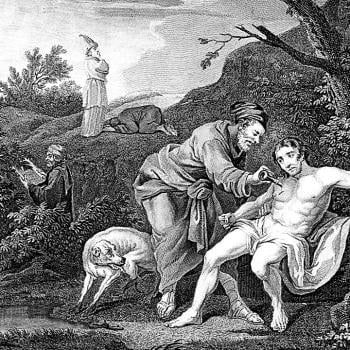From the Gospel of Saint Matthew
Jesus spoke to the crowds and to his disciples, saying, “The scribes and the Pharisees have taken their seat on the chair of Moses. Therefore, do and observe all things whatsoever they tell you, but do not follow their example. For they preach but they do not practice. They tie up heavy burdens hard to carry and lay them on people’s shoulders, but they will not lift a finger to move them. All their works are performed to be seen. They widen their phylacteries and lengthen their tassels. They love places of honor at banquets, seats of honor in synagogues, greetings in marketplaces, and the salutation ‘Rabbi.’ As for you, do not be called ‘Rabbi.’ You have but one teacher, and you are all brothers. Call no one on earth your father; you have but one Father in heaven. Do not be called ‘Master’; you have but one master, the Christ. The greatest among you must be your servant. Whoever exalts himself will be humbled; but whoever humbles himself will be exalted.”
After hearing this passage from the Gospel of Saint Matthew, the one thing you’re probably wondering is, “what in the world are phylacteries?”
Phylacteries were worn at the time of Jesus by Jews and are still worn today by some Jews. They are small leather boxes that inside contain quotes from the Old Testament in very small print. They are tied onto the person’s upper arm and on the person’s forehead. This is done to remind the person that the Word of God must constantly be kept in their minds. If you have a small box tied to your forehead, you will always be aware of it, thus always be aware of God’s Word.
My homily today however is not really about phylacteries, but it is about a truth of our faith we ought to keep always present before us in the way phylacteries are kept always in mind.
Today’s readings present a contrast between the teaching of the Pharisees and the teaching of Jesus.
Jesus accuses the Pharisees of tying up heavy burdens on the people forcing them to carry these burdens around without aiding them or helping them.
Saint Paul in contrast tells the Thessalonians that he has proclaimed the Gospel of God in order to not burden them. The Gospel lifts up burdens; it does not add burdens like the Pharisees. Paul recalls his toil and drudgery while proclaiming the Gospel. Unlike the Pharisees, Paul goes out to the aid of people so they may come to believe in Jesus Christ.
Jesus accuses the Pharisees of preaching and not practicing what they preach. The Pharisees love to be recognized for their large phylacteries and tassels, they love being called teacher, father and master even though they do not truly deserve these titles.
In stark contrast, Jesus Christ does not only preach, but he puts his words into practice. He puts into practice the words that closed today’s Gospel passage, “whoever exalts himself will be humbled; but whoever humbles himself will be exalted” by humbly dying on the cross. By humbling himself, he was exalted by God the Father who raised Him up from the dead.
Jesus does not look for places of honor and titles even though he deserves them. Jesus criticizes the Pharisees’ love of being called teacher, father and master when they are really none of them. Only those who are true teachers, true fathers and true masters to others deserve being called by those names. Us Catholic priests are called fathers because we truly are spiritual fathers of our flock, a great responsibility we strive to live out with God’s grace.
The Gospel of Jesus Christ is not meant to be a burden on the faithful but a message that frees us. Yet many people view it as a burden.
Pope Benedict told an interviewer some years ago in the book Light of the World, “The Church is not here to place burdens on the shoulders of mankind, and she does not offer some sort of moral system. The really crucial thing is that the Church offers [Jesus Christ].”
Those that feel burdened by the Gospel are erroneously reducing Christianity to a moral system. It is common to hear people say, “oh, he is a good Christian man, always behaving correctly, never doing any wrong.” The problem with this statement is that it reduces Christianity by equating Christianity with acting a particular way. If being a “good Christian man” means always being good, then nobody will be a “good Christian” because all people, even Christians, fall into sin.
Christianity is about a relationship with God, not a moral code. Christians aren’t perfect people; they are forgiven sinners who are forgiven over and over again.
The goal of the Church is to lead people to Christ where they will find happiness. Any moral guidance the Church offers is to help us achieve union with Christ and find happiness, not to control our lives or to place burdens on our shoulders.
The Gospel message allows us to live our lives joyfully knowing we have been redeemed and forgiven. Jesus Christ allows us to live with a certain levity to life that allows us to overcome obstacles.
Perhaps wearing phylacteries on our arms and foreheads would make it easier to remember Jesus’ presence in our lives every waking hour, yet we have something greater that not only reminds us of Jesus’ presence, but actually makes him present: the Eucharist. As we gather every Sunday, we acknowledge with certainty the fact that Jesus Christ is with us; that He comes to lift up our burdens, He comes to help us with our struggles. He humbly approaches us under the appearance of bread and wine so that we may worship Him and exalt Him.












